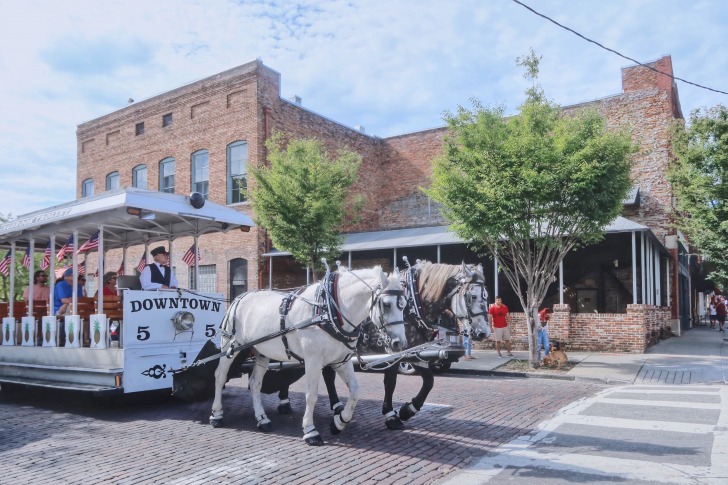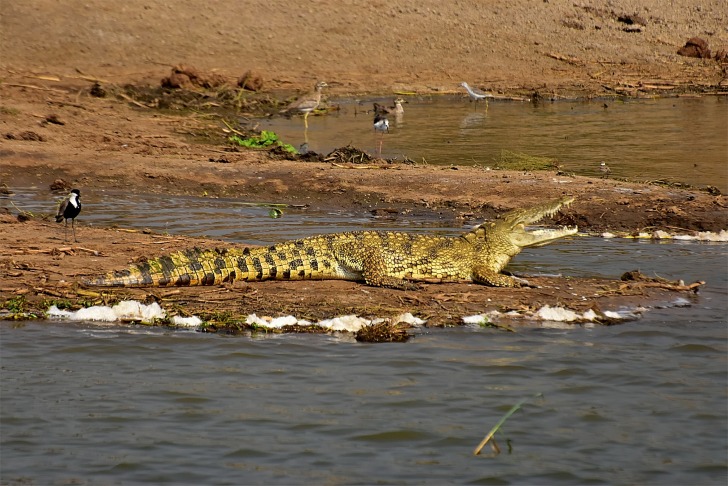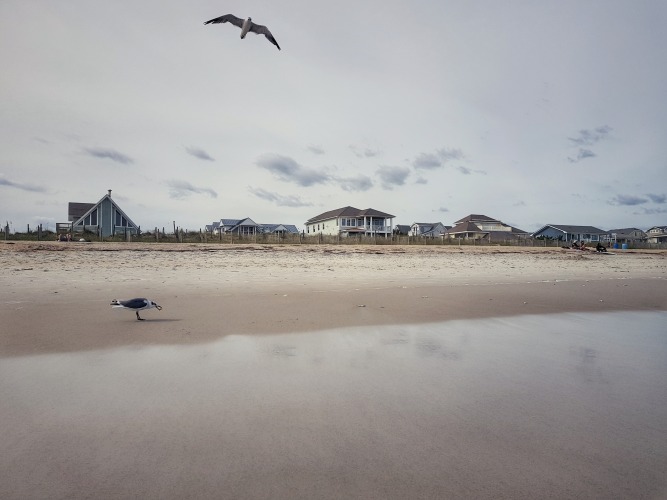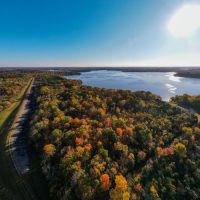Wilmington, North Carolina is a port city that is most known for its Civil War history and is the location of famous movies and television series.
One notable thing about Wilmington, North Carolina is its subtropical climate with hot and humid summers and warm winters.
Wilmington, North Carolina is home to a wide range of wildlife.
The question you may be wondering is whether this city is home to any alligators.

Contents
- So… Are There Alligators in Wilmington, North Carolina?
- Alligator Species in Wilmington, North Carolina
- Is it Safe to Swim in Wilmington, North Carolina?
- Interesting Alligator Facts in Wilmington, North Carolina
- Alligators vs. Crocodiles
- 3 Safety Tips for Swiming in Alligator-infested Waters
- Summary
- Wilmington Safety Overview
- Frequently Asked Questions
So… Are There Alligators in Wilmington, North Carolina?
The short answer to this question is yes! There are alligators in Wilmington, North Carolina.
The city has the ideal climate where alligators can thrive.
One of the more prominent places where you might spot a gator in the city is Greenfield Lake in Wilmington.
Alligators are present in and around the city in locations just over an hour’s drive away.
There have been sightings of alligators crossing the streets in Wilmington, NC, so big that the alligator shut down the road while it was passing.
There have been reports of alligator sightings in Bradley Creek, and one beach visitor spotted an alligator at Masonboro Island Reserve.
It’s been reported that alligators are more common in the Cape Fear area, which is approximately an hour’s drive outside of Wilmington, NC.
In addition, it was a rare sighting to see the alligator on Masonboro Island Reserve.
The alligator lives in freshwater lakes, ponds, swamps, and slow-moving rivers.
The Cape Fear river that runs through Wilmington is also home to alligators and the largest population can be found in the Cape Fear Estuary.
Alligator Species in Wilmington, North Carolina
There are only two alligator species left in the world.
The first is the American alligator (Alligator mississippiensis) and the Chinese alligator (Alligator sinensis).
The American alligator can be found in North Carolina, the Rio Grande in Texas, Louisiana, Florida, Georgia, and Alabama.
Both the male and female alligators have armored bodies with long, flat tails.
Their legs are short but they are able to sprint for short distances up to a speed of 35 miles per hour.
The alligator has five toes on its front feet and four toes on its back feet.
In addition, their feet are webbed, which enables them to swim very fast.
In fact, they are excellent swimmers.
The American alligator has a short, flat, U-shaped snout with two nostrils at the top of the snout.
The nostril’s position allows the alligator to breathe while the rest of its body is submerged underwater.
The males are larger than the females.
A male will typically grow to approximately 11 feet or three meters in length, while the female alligator will grow to eight feet or two and a half meters in length.
Some male alligators can grow to an astonishing 1,000 pounds!
The natural habitat of the American alligator is freshwater or brackishwater bodies and slow-moving rivers.
You may also find the American alligator in swamps, wetlands, marshes, bayous, ponds, rivers, and lakes.
If you notice an alligator in saline water, you are most likely looking at a crocodile, because alligators don’t have the salt glands to survive in saltwater.
It’s highly unlikely that you’ll find them in salt water, but not completely unlikely.
There have been sightings of alligators in salt water.
The American alligator can live up to 50 years of age in the wild.
The alligator is carnivorous and eats birds, mammals, frogs, fish, snails, and invertebrates.
They are known to be more opportunistic than aggressive hunters.
They will lie and wait for their prey to get close enough before they attack.
They are masters of camouflage and you will most likely not notice them until it is too late.
When alligators inhabit a body of water, people are often warned to stay clear of the banks of the body of water.
The alligator may confuse splashing with its prey.
Small children and animals are most at risk.
Though alligator attacks are rare and are not known to be aggressive toward humans, these attacks do occur from time to time.
Alligators are cold-blooded and rely on the environment to heat their body temperatures.
That is why you’ll most likely find them in subtropical and tropical climates.
When the weather gets exceptionally cold, they may lie dormant until the weather clears, though they are not known to go into hibernation.
Is it Safe to Swim in Wilmington, North Carolina?
If you want to swim in Wilmington, North Carolina, you have a few options.
You should remember though, that your safety will be determined by a few factors.
Firstly, it depends on where you plan to swim.
For the most part, the beach is the safest place to swim.
Although there have been alligator sightings on some of the beaches, it is very uncommon to find an alligator on the beach.
Swimmers should be very wary when swimming at the beaches as Great White Sharks are very common all along the coast of North Carolina.
In addition, there may be rip tides or strong currents which may cause drownings.
Swimmers should be cognizant of only swimming in areas with designated lifeguards.
As for the freshwater lakes, ponds, and rivers in and around the city, fishing may be fine but swimming may not.
Especially if there are known alligator sightings in those water bodies.
Always adhere to any advisory boards and make sure you do your homework before visiting an unfamiliar or unknown body of water in the Wilmington, North Carolina area.
Find out what wild animals are present in the area and if there are any known wildlife attacks on humans.
Of course, swimming in any swamp, wetland, or marsh is not recommended at all.

Interesting Alligator Facts in Wilmington, North Carolina
Alligators can be found in various parts of the state from Brunswick County to Gates County and across to Robeson County.
A large population of alligators in Wilmington, North Carolina can be found in the Cape Fear region as well as in Greenfield Lake.
According to the North Carolina Wildlife Resources Commission, the North Carolina alligator is smaller than alligators found in the south.
The commission goes on to state that while alligators in the south tend to grow to 15 feet and longer, the North Carolina alligators rarely grow to be longer than 13 feet.
The stunt in their growth can be attributed to colder water and shorter feeding seasons in the north.
The most famous alligator in North Carolina was named Charlie and was the unofficial mascot of the state.
The gator can be spotted near Wilmington’s Battleship North Carolina Memorial.
The total number of alligators present in the state is unknown and those who have sightings are encouraged to report the sightings to the NC Wildlife Resources Commission.
Unlike Florida, there is no hunting season in North Carolina.
In fact, you are looking at a hefty $500 fine or, even worse, a two to 24-month jail sentence if you feed, harass, or kill an alligator in North Carolina.
It is against the law.
According to research, most alligator attacks occur because people try to pick up the alligator, catch it, or feed the alligator.
Residents in North Carolina are advised to call the NC Wildlife Resources Commission if they spot an alligator to have it removed safely.
This is for the safety of the gator and the residents.
Furthermore, residents are reminded to stay at least a school bus distance away from baby Gators and double that for adult alligators.
Alligators vs. Crocodiles
Many people are confused between alligators and crocodiles, but there are a few easy ways to tell them apart.
The first difference is in the snout.
An alligator has a shorter, U-shaped snout and a crocodile has a long, tapered snout.
The snout of the crocodile is more of a V-shape.
In addition, the alligator has a broad upper jaw that overlaps the lower jaw and hides the lower teeth, while the crocodile has an upper and lower jaw of the same size.
The teeth are able to integrate and both the upper and lower teeth are visible.
Speaking of teeth, the alligator has approximately 80 teeth in its mouth but will go through 2,000 to 3,000 teeth in its lifetime due to its carnivorous diet.
The crocodile has 66 teeth.
There is a distinct size difference between these two reptiles as well.
The alligator is generally smaller than the crocodile.
The alligator male will grow to approximately 11 feet in length and can weigh up to 1,000 pounds, while the crocodile will grow to approximately 20 feet in length and can weigh up to 2,000 pounds.
In both the alligator and crocodile species, the males are larger than the females.
And their colors differ.
The alligator is usually dark gray or black, while the crocodile is light green or brown in color.
3 Safety Tips for Swiming in Alligator-infested Waters
- Try to avoid swimming in alligator-infested water whenever possible. The problem with swimming in water known to host alligators is that you are never really sure where the alligators are in the water. They are opportunistic hunters and may confuse splashing in the water as prey. The American alligator will rarely attack unprovoked, but you just don’t want to take the risk.
- If you are near a body of water known to host alligators, you should always keep your small animals on a leash and never allow them to play or drink the water near the banks. In addition, keep an eye on small children and do not allow them to play near the bank of the water.
- Never go into the water if you know there are alligators between dusk and dawn. These are the times when alligators are most active.
Summary
There are alligators present in and around Wilmington, North Carolina.
These alligators are on the endangered list in the state of North Carolina and hunting, killing, or harassing the alligators could lead to a hefty fine, jail time, and a replacement fee.
The largest alligator population can be found around Greenfield Lake and the Cape Fear area.
The exact population numbers are unknown in the state and visitors and residents who spot an alligator are advised to report sightings so that other guests and residents are aware of their location and a head count can be conducted.
Wilmington Safety Overview
READ THE FULL REPORT: Wilmington Safety Review
Safety Index:
- OVERALL RISK: LOW
- TRANSPORT & TAXIS RISK: LOW
- PICKPOCKETS RISK: MEDIUM
- NATURAL DISASTERS RISK: MEDIUM
- MUGGING RISK: LOW
- TERRORISM RISK: LOW
- SCAMS RISK: LOW
- WOMEN TRAVELERS RISK: LOW
Frequently Asked Questions
Have there been fatal alligator attacks in Wilmington, North Carolina?
Yes.
There have been a few reported alligator attacks in Wilmington, NC and some of these attacks have been fatal.
Will alligators attack kayakers?
Yes.
Although it is pretty rare that an alligator will attack a kayaker.
If you go kayaking in areas with an increased number of alligators, your chances of being attacked also increase.
Are there alligators on North Carolina beaches?
Alligators typically live in freshwater bodies, but there have been sightings of alligators in salt water in North Carolina.












Yes, there are alligators in Wilmington, North Carolina and they can be found in various locations including Greenfield Lake and the Cape Fear area.